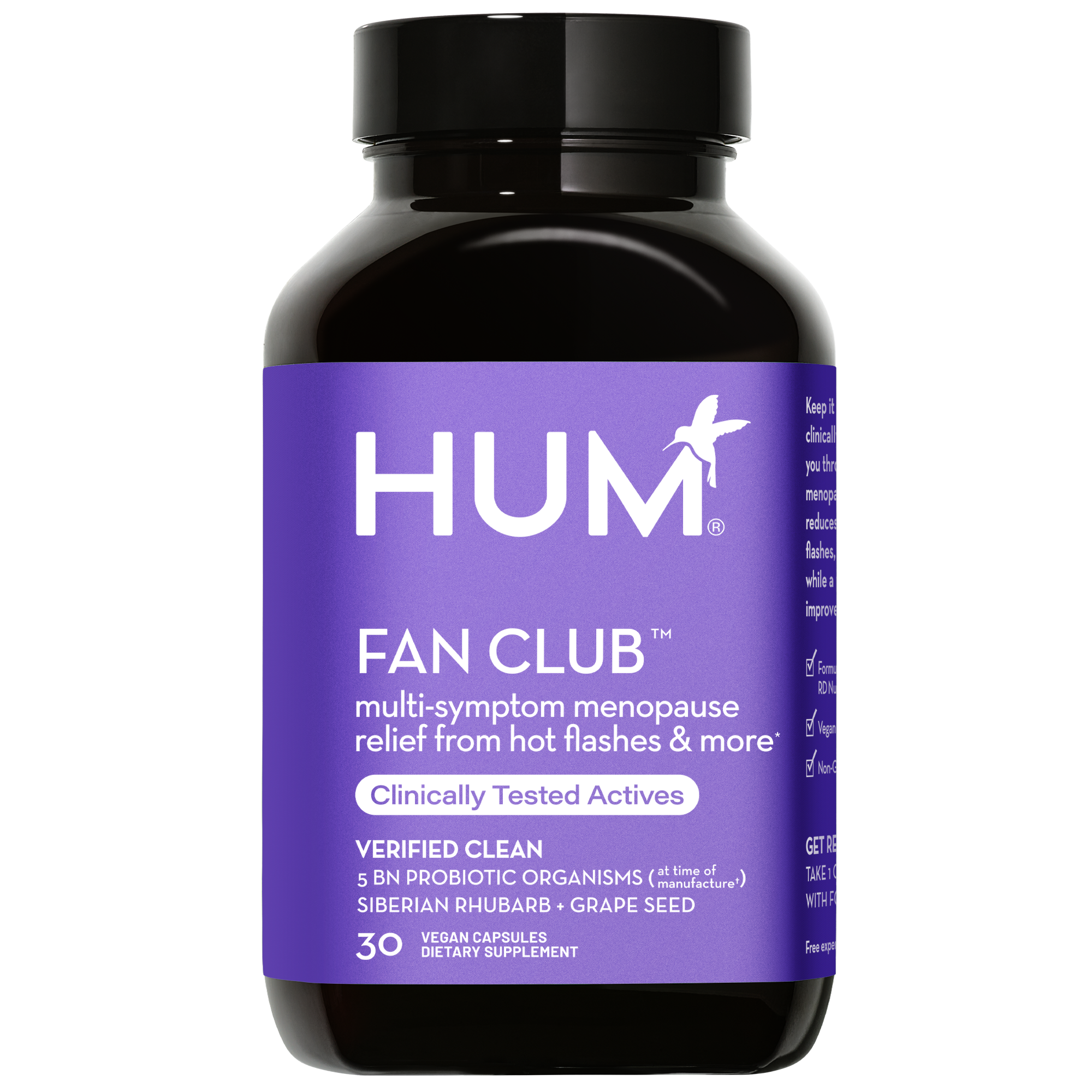Depending on whether you’re in perimenopause, have reached menopause, or are post-menopausal, you could be experiencing any combination of symptoms: vacillating between chills and night sweats, thinning hair, dry skin, vaginal dryness, low libido, and even mental health-related symptoms such as anxiety, depression, and insomnia. Another common signifier of the menopausal period is the overall slowing of your metabolism, and in some cases, menopause weight gain. Blame your hormones on what some call a “menopause belly,” but know that every hormonal change happening to your body, including changes in your weight, is completely normal.
Regardless of what you’re going through during menopause, you’re not the only one. Managing menopause symptoms like menopause weight gain is possible. Read on to better understand what’s going on with your hormones during menopause that might be causing weight changes and how to ensure you’re making your health a priority during this time.
Why do some people gain weight during menopause?
During perimenopause, which can begin 8 to 10 years before menopause (usually your early to mid-40s), hormonal shifts leading up to menopause begin. The ovaries gradually stop producing as much estrogen—one of the main hormones that regulate your period—until eventually, they stop releasing eggs during the ovulation period each month. After 12 consecutive months without a period, you’ve reached menopause.
But these hormonal shifts aren’t exactly linear. “While progesterone follows a slow and steady decline, estrogen levels can rise and fall quite erratically, sometimes even the same day,” explains Sapna Shah, MD, an endocrinologist with Paloma Health.
So how does that play into menopause weight gain? Besides being a key player in your menstrual cycle, estrogen plays a role in storing fat on the thighs and hips, especially during your reproductive years, when you’d need more weight in those areas to sustain a healthy pregnancy.
When you get closer to menopause and estrogen levels drop off, that fat storage relocates to the abdominal area. More research needs to be done, but this seems to happen because estrogen is no longer circulating throughout the body and estrogen receptors change, redistributing more fat to the middle of the body.
It’s common to have wider hips, softer skin, and more weight, especially in the belly area. “But, you will not necessarily experience inevitable weight gain, especially if you are proactive in maintaining a healthy weight,” adds Dr. Shah.
Should you be concerned about menopause weight gain?
Menopause isn’t the only reason you may gain weight as you get older. First of all, your metabolism slows as you age. You might also find yourself slightly less active and therefore burning fewer calories to begin with. The amount of body fat also increases as you get older. “It becomes easier for our bodies to store energy as fat instead of converting it into new muscle tissue,” explains Dr. Shah. “Not to mention, lipid turnover is reduced as we get older, so it is harder to shed fat with exercise.” Genetics play a role, too. So no, you shouldn’t have an immediate concern with a few extra pounds during menopause or post-menopause.
Just be mindful of the health risks associated with accumulating too much visceral fat (which is stored deep in the body, wrapping around the organs) in the belly area. “Deep belly fat is linked to an increased risk of type 2 diabetes, higher blood pressure, high cholesterol levels, and inflammation, all of which contribute to heart disease,” says Elizabeth Ward, MS, RDN, co-author of The Menopause Diet Plan: A Natural Guide to Hormones, Health, and Happiness.
Those cardiovascular risks associated with extreme weight gain can be dangerous because heart disease is the leading cause of death in postmenopausal women. Obesity is the real risk factor: It’s more prevalent after menopause, and affects 25 percent of postmenopausal women in the U.S., predisposing them to not only heart disease and diabetes but strokes, sleep apnea, and certain types of cancer.
Ultimately though, minor weight gain that you experience leading up to menopause or during the postmenopausal period is part of the natural hormonal process. Your weight won’t be the same as it was at age 25, nor does it need to be—your body doesn’t need to function in the same way as it did when you were 25. “Your optimal weight should be one where you feel your best and you are not increasing your risk for the health issues listed above,” Dr. Shah says.
How can you manage menopause weight gain?
There are adjustments you can make to your diet and lifestyle to help mitigate some of the hormonal changes that can lead to menopause weight gain.
Go primarily plant-based.

There hasn’t been much research or instructions about specific diets to follow during menopause, Ward explains. One older study published by the American Heart Association found that pre-menopausal people between the ages of 44 and 50 who received nutritional guidance over a 5-year period about an eating plan had very little weight gain going into menopause. That eating plan focused on lowering their cholesterol and saturated fat intake as well as increasing their level of movement each week. (The Galveston Diet is also popular among people going through menopause, though no direct evidence has been done on it.)
What Ward recommends based on her own research is an eating plan that’s some combination of the Mediterranean style of eating and the DASH (Dietary Approaches to Stop Hypertension Diet, designed to keep blood pressure healthy. Go for at least 5 servings of fruits, vegetables, including legumes each day, plus 3 servings of whole grains and 3 servings of low-fat dairy foods (if you eat dairy), says Ward. She also recommends eating fish at least twice a week for heart-healthy omega-3s, and any other lean proteins you like.
This “diet” is less about adhering to or eliminating certain foods, and more about a whole foods-focused, balanced pattern of eating, which means limiting sugary and highly processed foods and alcohol as much as possible.
Prioritize protein.
“The most important nutritional change women going through perimenopause or menopause can do is increase dietary protein,” says Abby Grimm, MS, RDN, LD, a registered dietitian at FWDfuel Sports Nutrition. Protein intake, particularly from the amino acid leucine (found in both animal and plant-based sources of protein), is necessary to maintain and build more lean muscle, which in turn helps the body burn fat, Grimm says. Focusing on protein is not only key for lean muscle but for bone health as you age, adds Ward.
Minimize simple carbs.
Because of changes in your metabolism, it may be more difficult to process carbohydrates. “As hormones are shifting, especially decreasing estrogen levels, the body is not able to build lean muscle as efficiently as it can with a normal menstrual cycle. This results in impaired utilization of carbohydrates and fat gain,” says Grimm.
You don’t need to eliminate carbs or follow a keto or Paleo-style diet, but shifting toward a more protein-heavy plan and decreasing your intake of simple, refined carbs is the objective, Ward says. Aim for fewer servings of sugary cereals, granola bars, bread and bagels, pastries, crackers, and chips, Grimm suggests.
Boost mood and muscle with movement.

Movement, especially resistance training of some kind (more on that below), coupled with eating more protein is going to help build that lean muscle as opposed to fat. But regular exercise nourishes your mental health too, particularly during the menopausal period, when anxiety and stress can spike. As Ward explains, elevated stress levels can impair weight loss and may contribute to weight gain due to the stress hormone, cortisol.
Grimm recommends an exercise routine that incorporates both strength training and some high-intensity interval training to get the heart rate up. “This type of exercise is much more effective than doing hours and hours of steady-state cardio when trying to limit visceral fat gain,” Grimm says. Those intense bursts of exercise that raise your heart rate way up can help the body burn fat and use glucose more efficiently.
Build strength.
When it comes to strength training, it’s worth picking up those dumbbells: A University of Arizona study found that a year of strength training helped postmenopausal women build more lean soft (aka fat-free) tissue in their bodies. Resistance training about three times a week also could reduce the symptoms of hot flashes, another trial found. The endorphins released during exercise could help the body regulate its own temperature, according to the research.
Lifting weights and HIIT workouts can both help the body reduce both inflammation and cortisol, Grimm adds.
Whatever you do, don’t crash diet.
Restricting your eating by following strict “diets” or counting calories is not going to be sustainable for your weight or health during menopause, says Ward. Avoid cutting out food groups (unless you have a known allergy or intolerance), which can lead to inadequate nutrients needed to build muscle and reduce fat. “Fad diets may also be detrimental to your mental health if they cause you to be obsessed with food or otherwise trigger disordered eating,” Ward says. (Menopause can be a vulnerable time for your mental health in the first place.)
Get your sleep in sync.

26 percent of menopausal people have severe insomnia symptoms that disrupt their functioning the next day, reports Nature and Science of Sleep. One culprit might be that melatonin, one of the main hormones that regulate sleep in the body, dips during menopause.
Getting into the right sleep routine and getting enough sleep can help keep your metabolism on track and therefore help with healthy weight maintenance. “Having a specific bedtime and wake-up time can help regulate your circadian rhythm,” says Dr. Shah. Managing your stress and being able to wind down at night is a factor in this. Relaxing baths or showers in the evening rather than the morning can be part of a wind-down routine but also can lower the body’s core temperature and prepare the body to sleep, according to the Sleep Foundation. And especially during menopause, you’re going to want to sleep as cool as possible to avoid night sweats: so lower your bedroom thermostat, put cooling cotton or microfiber sheets on the bed, and sleep in super light pajamas or even moisture-wicking workout clothes to stay extra cool.









